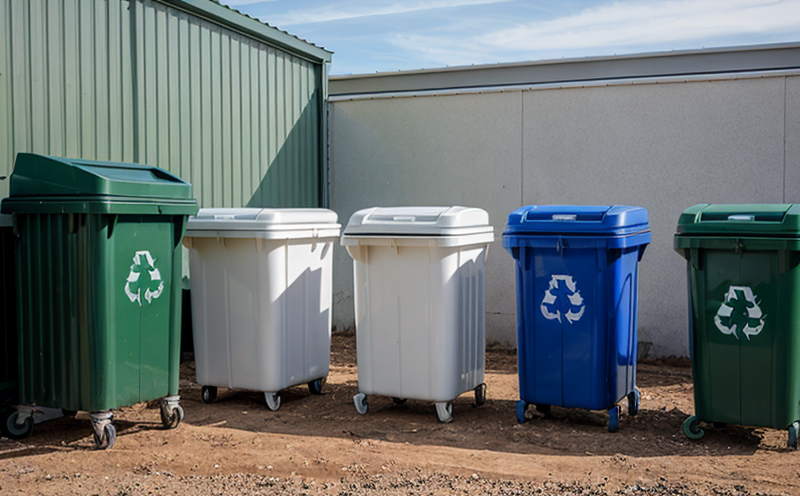ASTM D5338-21 Composting Simulation Test
The ASTM D5338-21 Composting Simulation Test is a crucial procedure designed to evaluate the biodegradability of plastics and other materials under controlled composting conditions. This test provides valuable data on how quickly a material can break down in a commercial composting environment, which is essential for assessing its potential impact on the environment.
The ASTM D5338-21 standard outlines specific parameters to ensure that the simulation accurately reflects real-world composting conditions. These include temperature, humidity, and microbial activity levels that mimic those found in industrial compost facilities around the world. By conducting this test, manufacturers can gain insights into their product's environmental friendliness, helping them make informed decisions about sustainable packaging solutions.
One of the key aspects of ASTM D5338-21 is its emphasis on controlled conditions to ensure consistent results. The test involves placing samples in a sealed container containing controlled amounts of moisture and microorganisms. Over time, these factors promote decomposition, allowing researchers to measure changes over set intervals.
The outcome of the ASTM D5338-21 test is expressed as biodegradation percentage based on weight loss or mass reduction after exposure to composting conditions. This metric helps stakeholders understand not only whether a material decomposes but also how efficiently it does so relative to other materials used in similar applications.
For those involved in developing new eco-friendly packaging designs, understanding the results from this test can be invaluable. It allows for iterative improvements aimed at enhancing both performance and sustainability without compromising functionality or cost-effectiveness.
| Parameter | Description |
|---|---|
| Temperature Range | 58°C to 60°C |
| Humidity Level | Absolute humidity of 75% RH ± 2% |
| Microorganism Type | Mixed cultures typical of industrial composting environments |
The ASTM D5338-21 test is widely recognized for its ability to provide accurate insights into the biodegradability characteristics of various materials. Its rigorous standards help ensure that products labeled as 'compostable' truly meet those claims, fostering trust among consumers and regulatory bodies alike.
Industry Applications
| Material Type | Possible Application |
|---|---|
| PLA (Polylactic Acid) | Bakeware, disposable cutlery, and containers |
| Biodegradable Polyolefins | Packaging films and mulch films |
The ASTM D5338-21 test is particularly relevant for industries focused on reducing waste and promoting recycling efforts. This includes sectors like food packaging, agricultural products, and consumer goods where minimizing environmental impact is a priority.
By ensuring that materials used in these areas can effectively decompose during composting processes, businesses contribute to more sustainable practices throughout their supply chains. The test results help manufacturers identify which polymers perform best under specific conditions, enabling informed choices regarding material selection and process optimization.
Why Choose This Test
- Ensures compliance with international standards for biodegradability.
- Promotes sustainable design practices by providing objective data on material performance.
- Supports product development through continuous improvement initiatives based on realistic simulation results.
- Aids in meeting regulatory requirements related to waste management and environmental protection.
The ASTM D5338-21 test offers numerous advantages over other methods of evaluating biodegradability. Its standardized approach ensures consistent outcomes across different laboratories, making it easier for companies to compare results and make strategic decisions. Additionally, by focusing on actual composting conditions rather than laboratory simulations, this test provides more reliable predictions about real-world performance.
For quality managers, compliance officers, R&D engineers, and procurement professionals involved in packaging development or sustainability initiatives, the ASTM D5338-21 test represents a critical tool for ensuring that products meet both regulatory expectations and company goals for environmental responsibility. Its use can lead to reductions in landfill waste while supporting broader objectives related to circular economy principles.
International Acceptance and Recognition
The ASTM D5338-21 test has gained widespread acceptance globally due to its rigorous methodology and relevance across various industries. It is accepted by regulatory agencies such as the European Commission, which recognizes it for compliance purposes within EU directives on packaging waste management.
Many countries have adopted similar standards or referenced ASTM D5338-21 in their own regulations regarding biodegradable plastics. For instance, Australia's National Packaging Covenant references this test when setting targets for reducing packaging impacts on the environment.
The growing demand for sustainable solutions has driven increased interest in tests like ASTM D5338-21 among producers and consumers alike. By participating in such testing programs, manufacturers demonstrate their commitment to responsible manufacturing practices and contribute positively towards achieving global sustainability goals.





